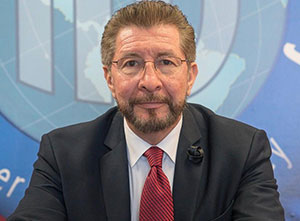In Colombia, Petro repeats “successful” castrochavist plan previously applied in Venezuela, Bolivia, and Nicaragua

By: Carlos Sánchez Berzaín - 14/05/2023
Share:
Democratically elected President as the first minority of Colombia, Gustavo Petro governs with the transnational plan of 21st Century Socialism, or Castrochavism, designed to confront peoples, empower organized crime and narcotics’ trafficking, attack democratic institutions and political parties, exacerbate conflicts with a populist discourse and take the country towards a situation of weakness that will enable him to have total control of power. Petro repeats the “successful” Castrochavist strategy directed by Cuba whose results can be seen in Venezuela, Bolivia, and Nicaragua.
Under this Castrochavist strategy, success consists of having total control of power and the consolidation of a non-democratic system and not in the results that are catastrophic, because; they make freedom disappear, violate human rights, perform governmental tasks with State-terrorism, remove the separation and independence of the branches of government, make the rule of law disappear, institutionalize electoral fraud and persecute the opposition with political prisoners, assassinations, and exiles. These are typical features of the regimes that now wield power in Venezuela, Bolivia, Nicaragua, and was also in Ecuador while Correa was in power.
Consequences are noticeable: Cuba, that is the epicenter of conspiracy and strategy, has its peoples subjected in a “total crisis” of hunger and misery. Venezuela, the main expansion of the Castrochavist model, has subjected its peoples to a “humanitarian crisis” and oppression from which people now flee. Bolivia’s dictatorship has its peoples under an “economic crisis” and oppression. Nicaragua’s dictatorship has created a “terror crisis” with crimes against humanity committed there. All four States are narco-States and their regimes are antiimperialist.
The Castrochavist plan consists of the gradual and intensive deterioration of essential components of democracy. It, systematically, violates freedom and human rights, empowers organized crime and narcotics’ traffickers by incorporating their operators as players of national politics; it attacks democratic institutions with populist speeches that are pleasing to the people but lead to the destruction of existing systems, such as the health, education, housing, security systems and more. It manipulates the freedom of the press by identifying the free press as anti-national, bourgeois, or from the far right, it gradually destroys private property and businesses, propounds the creation of Constituent Assemblies in order to liquidate the Republic, in sum, it asks for a revolution that truthfully is submission, instead.
Twenty-first Century Socialism when it takes over a government with a President such as Chavez in Venezuela, Morales in Bolivia, Correa in Ecuador, or Ortega in Nicaragua, has demonstrated that it applies the technique of a “soft coup d’état” which consists in “the use of a set of non-frontal conspiracy, and progressive techniques to destabilize the system and cause its replacement.” These are “successive coups d’état that destroy the institutionality until it is replaced by the total concentration of power.”
In Venezuela, Chavez swiftly pursued the takeover because he had control of the Legislative and implemented his Constituent Assembly that ended Venezuelan democracy. In Bolivia, Morales had to have massacres, persecute and corrupt the opposition who -by allowing the commission of crimes- led to the establishment of the dictatorship. In Ecuador Correa’s total control and the rampant corruption allowed him to become a dictator, something that was later suppressed due to the courageous leadership of President Lenin Moreno. In Nicaragua, dictatorship was possible due to the surrender of corrupt opposition’s leaders and their willingness to be subjected in exchange for impunity.
To fully understand what Petro is doing in and to Colombia, one only has to review the history of Chavez in Venezuela, Morales in Bolivia, Correa in Ecuador, and Ortega in Nicaragua. Petro started vindicating narcotics’ trafficking, repeating the narrative of the supposedly failed war on drugs to pave the way to continue supporting guerrilla/narco-groups organized and sustained by Cuba and Venezuela. He placed Colombia’s foreign affairs at the service of the dictatorships, including his personal involvement in State visits to the United States and Spain. The openness of Petro’s government and his subordination to Venezuela’s regime and to dictator Maduro affects Colombia’s national security and can constitute serious crimes.
Petro’s speech on 1 May from the balcony of the presidential offices, mimics that of Chavez, Morales, Correa, Maduro, and Ortega with threats to democracy, and an open proclamation of a Coup d’état, historical fallacies and manipulated interpretations, calling for popular uprisings, inciting confrontation, and crime under the pretext of a “revolution.” The attack against the Attorney General is not a petty matter because it shows a dictator exerting his power who is halted by the institutionality of Colombia’s Supreme Court of Justice. The attack -nevertheless- has placed the life of the Attorney General and his family at risk, and more.
*Attorney & Political Scientist. Director of the Interamerican Institute for Democracy.
Translation from Spanish by Edgar L. Terrazas
«The opinions published herein are the sole responsibility of its author».